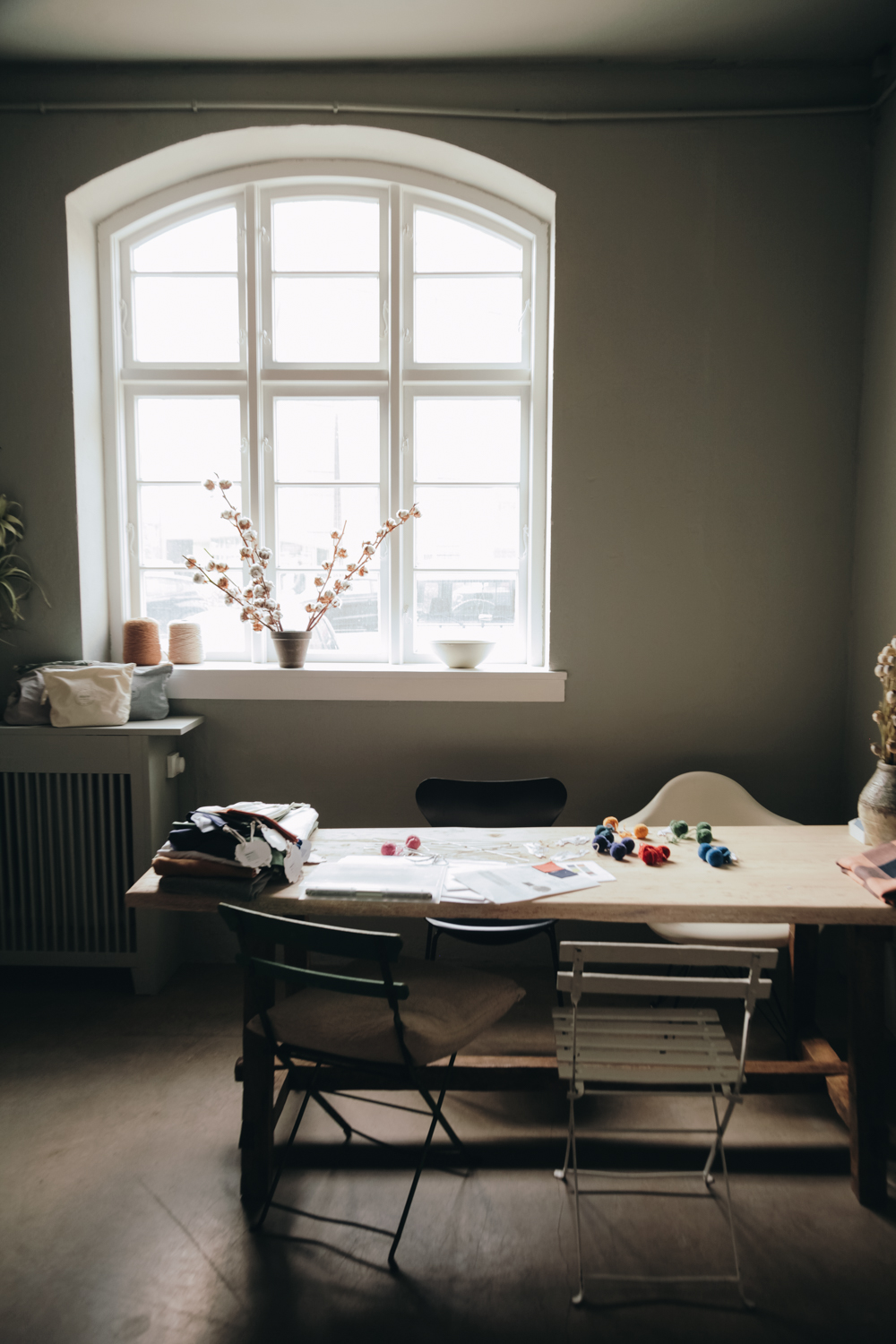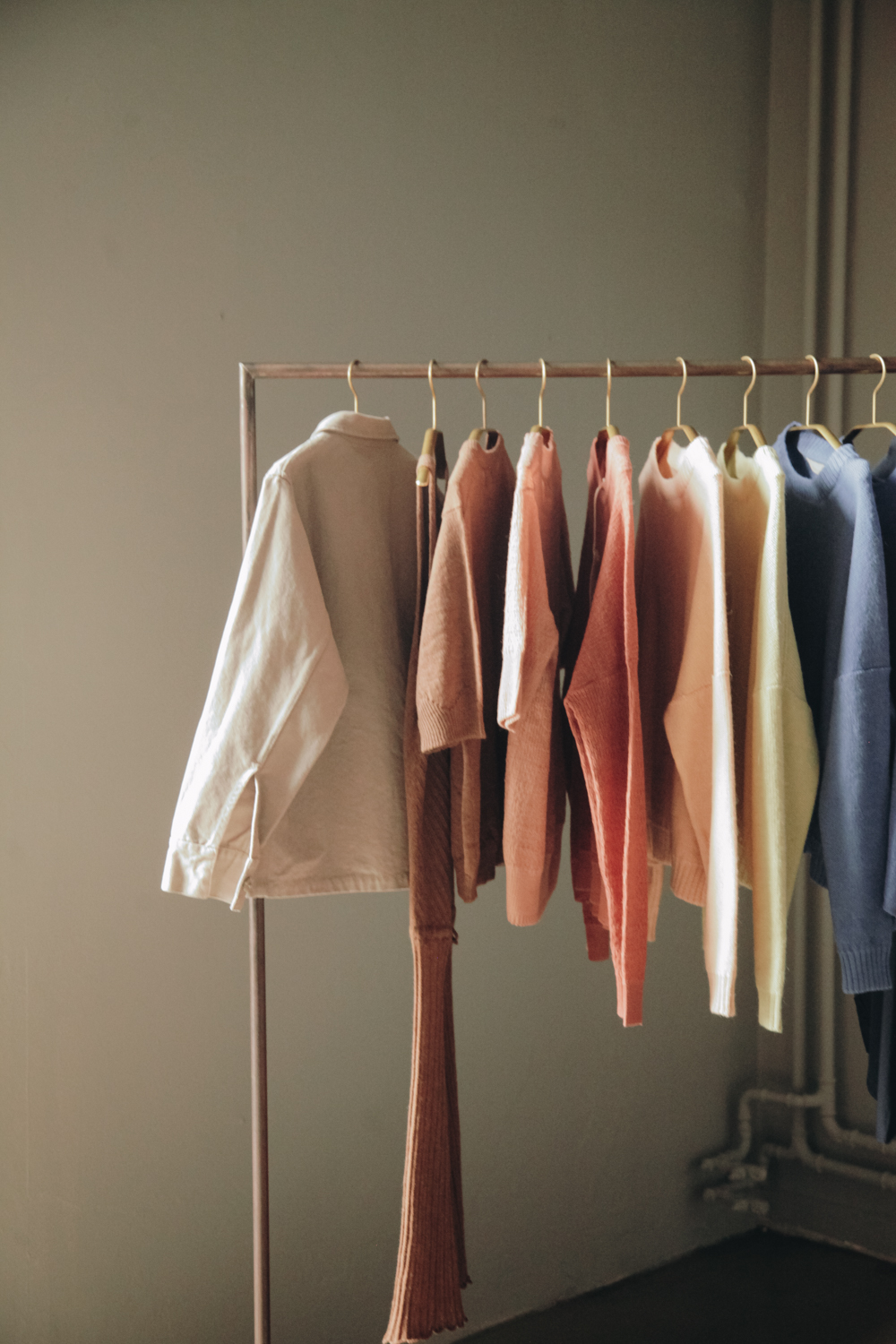Is it possible to make fashion truly sustainable? Is it possible to make anything truly sustainable? It can feel like an overwhelming question, especially when we see the damage that the world is currently facing, and trying to undo. But not trying isn’t an option anymore, with the information and technology we now have at our disposal. That’s what Danish fashion brand AIAYU thinks, and they’re working hard to not only produce sustainably and ethically, but also call out the loops in their own process in an everlasting bid for improvement.
In terms of design, AIAYU is simple and unpretentious, using durable fabrics and clean silhouettes that will withstand lots of wear and outlast trends. Their color palette is particularly wonderful, with muted yet joyful tones that evoke the brushstrokes of nature; the blue of the sky or the pale peach of a sunset. Stepping into their world is special because of the care they devote to not only their production, but the people behind it.
We spoke with founder and Creative Director of AIAYU, Maria Høgh Heilmann, to find out more about what “Zero Waste” means in the fashion industry and what is the future of sustainable fashion:
When and why did you found Aiayu?
I was working as a designer in Italy and in Denmark, going round the hamster wheel. Fashion’s cost to environment and humanity appalled me. It was a wish I had brewing for a while: to create beautiful clothes made 100% responsibly in a way that cares for the planet and for the people who make them. I went to Bolivia for a holiday, and saw llamas roaming free in the Bolivian highlands, and cholitas knitting almost everywhere. I learned that the long fibres of the llama wool make it less prone to pilling and that it’s warmer than many other types of wool. The challenge of doing something with this wool and using the local craftsmanship excited me.
 |  |
The factory in Bolivia was AIAYU’s first sustainable initiative. An existing wool production was expanded to become a the first knitwear factory in Bolivia through our funds and direction. We were also the first to implement a water recycling plant, cleaning 100% of the water and reusing 75% of it.
So Bolivia is where it started. It built our foundation on quality, sustaining cultures and craftmansip. We discovered that the best expertise lies where the raw materials are naturally found and therefore we expanded to cotton in India and yak wool and cashmere in Nepal. We also learned that commerce is more empowering than charity, both for the local people and for their cultures.
How did you choose the countries you are currently working with?
We choose to source and produce at origin. This way we get the best quality product, have access to best craftsmanship and are able to support ancient craftsmanship skills. India was particularly interesting to me as it has a rich history of textile work and is home to cotton. But it is a conventional, polluting production region with a poor record of labor rights. It felt like the right challenge for us at AIAYU. Today we produce all our cotton in India with 100% organic cotton, in a factory that runs 70% on clean solar energy and meets a number of ethical certifications.
 |  |
What does “Zero Waste” mean to AIAYU?
To us it means the only responsible way to produce. It means to use nature’s precious materials to their optimum potential. We use all the scrap from our cotton production to create new products such a rugs, bags, hang tags and quilts. We re-use approximately 4000 tons of what would otherwise have ended in a landfill. Scrap from high-quality cotton is still high-quality material and we treat it as such; not as a by-product.
Why do you think companies choose not to use a “Zero Waste” or non-sustainable approach?
I don’t understand why more companies don’t produce sustainably! I know from our own experience that it is possible to produce almost 100% sustainably even for a mid-sized company like ours. It takes work and some creativity, but it is possible to be sustainable and profitable. We see it as the only reasonable way forward. Part of our mission is that proving it is also financially viable.
Is ethical labor part of sustainability?
Without doubt! What is the point of producing with care for the environment if we don’t care for the people living on this planet? Unhappy people wage wars and cause destruction. We have to care for both planet and people.
 | |
 |  |
What does ethical labor practice mean to you? How do you ensure that with AIAYU?
On an elementary level, it means fair and safe working conditions. It should offer wages from which one can live with dignity, and the job should not be a threat to their health or well-being. To me, ethical labor also means that people should work under happy conditions: they are appreciated, given chances to enhance their skills, and given credit for their work. Happy people create better products and want to stay in their jobs.
At AIAYU, all our hand-knitted items bear the initials of the person who made them. I believe products should connect people. The end buyer should know that behind the purchase is a human being. To ensure ethical labor practices, I make yearly visits to our factories. Our factories have to adhere to some of the strictest certifications, including WRAP, GOTS and SA8000 for ethical and humane production facilities, so there are additional third party checks. We are also a part of the UN Global Compact.
What are the current holes in your Zero Waste supply chain system that you’re trying to close?
The end of a garment’s life is a gap we would like to close. We offer a repair service, so customers can send in their items for repair, but sometimes an item is beyond repair. We would love a way to collect these pieces and upcycle them or dispose of them responsibly. We only use natural fibers so they are all bio degradable, but they still need to be disposed in the proper way.

What do you see as the main obstacle(s) to full sustainability in fashion? Is it ever achievable?
Corporate Greed and lack of will are the main obstacles. Yes, it is achievable. Technology can play a positive role in achiving full sustainability: water re-processing, sustainable synthetic fibers. This is nessesary because natural reasources are limited. If companies aren’t acting now, in the future they can be pushed by customer awareness and demand.
Do you see the large companies with sustainability policies are truly trying to make changes?
Some are making are difference. Doing a little something is better than doing a lot of nothing, so all sustainability polices from companies big and small are welcome!
Take a closer look at the AIAYU “Zero Waste” supply chain:

Get 20% off everything on the AIAYU site until 24th April! Just use the code SCANDI20 at checkout for your discount. Happy sustainable shopping!
Photography by Freya McOmish

